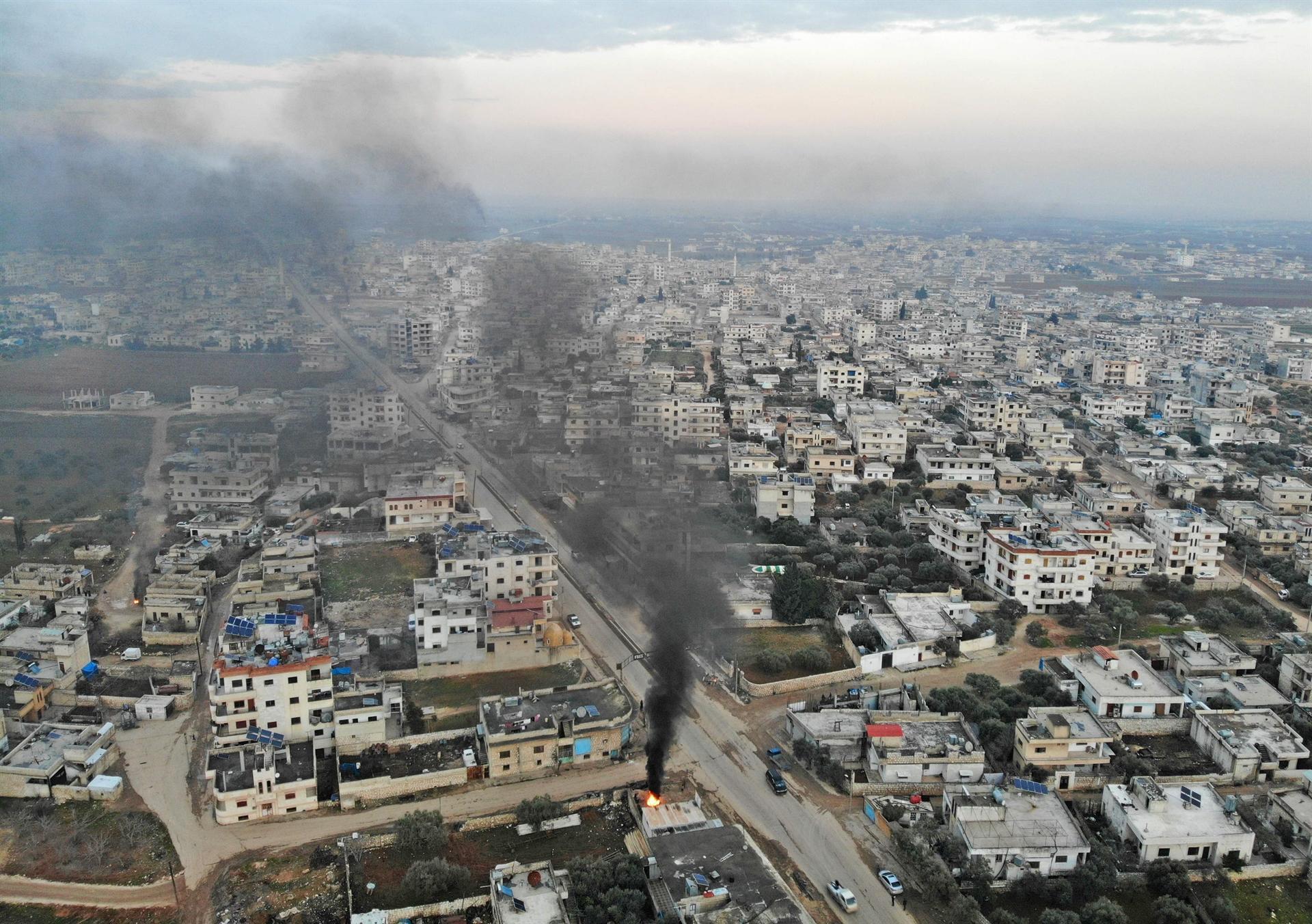
An aerial view taken on February 6, 2020 shows smoke billowing from tyres burnt by Syrians in an attempt to hinder airstrikes amid clashes between rebel fighters and regime forces in Idlib's Binnish town. (AFP Photo)
Turkey’s presidential spokesperson İbrahim Kalın has said that changing borders of the Idlib de-escalation zone in northwestern Syria, as determined by Astana and Sochi agreements, is out of the question.
Speaking at a news conference on Feb. 6, Ibrahim Kalın said it is not possible for Turkey to accept any proposal of change regarding the de-escalation zone.
Kalın reiterated that Turkey's 12 observations points in northwestern Syria will remain in their places.
He also said the meeting of the Astana process might be held in March.
Turkey, Russia, and Iran held meetings in Kazakhstan's Astana city in 2017 and announced that Idlib and neighboring cities, Eastern Ghouta region of capital Damascus and southern regions, namely Daraa and Quneitra cities, would be de-escalation zones.
However, the Assad regime and Iranian-backed terror groups launched attacks in violation of the agreements and, thanks to Russian air support, gained control of all these territories with the exception of Idlib city.
In September 2018, Turkey and Russia agreed to turn Idlib into a de-escalation zone where acts of aggression are expressly prohibited.
The Syrian regime and its allies, have consistently broken the terms of the cease-fire -- including a fresh cease-fire on Jan. 12 -- launching frequent attacks inside the zone, killing at least 1,300 civilianssince the agreement.
Migration flow from Syria
Kalın said Turkey will continue its efforts with non-governmental organizations to prevent the further flow of refugees from Idlib.
He emphasized that Turkey will provide necessary deployment and support to ensure the security of civilians.
One of Turkey's priorities is the withdrawal of regime forces to the borders of the de-escalation zone by the end of this month, he added.
Turkey warns of severe response to Syria regime attacks
Turkey's U.N. Ambassador Feridun Sinirlioğlu on Feb. 6 warned of a severe punishment against Syrian regime aggression in Idlib.
Addressing the U.N. Security Council in New York, Sinirlioğlu said Syria’s Bashar al-Assad wanted to draw Turkey into "his dirty war by deliberately targeting" Turkish military forces.
"Any military aggression targeting Turkey's security and Turkish soldiers will be severely punished," he said. "We will never hesitate to use our right to self-defense. I am not drawing a red line here. This is a warning."
He asserted that Turkey believes in a political solution in the war-torn country and it is working with the U.N. for a settlement there.
"But Turkey will never tolerate any belligerent act," he added.
On Feb. 3, Syrian regime forces attacked Turkish troops, resulting in the deaths of seven Turkish soldiers and one civilian personnel.
In retaliation, the Turkish military targeted more than 50 positions and neutralized more than 70 Syrian regime troops, according to Defense Minister Hulusi Akar.
Meanwhile, Russian-backed Syrian forces advanced through Idlib province on Feb. 6 in a brutal ground offensive that was preceded by weeks of intensive aerial bombardment which emptied whole towns of terrified civilians. After prolonged clashes between opposition forces, anti-government armed groups and regime forces, Saraqib's city center was captured by the regime forces with Russian air support.
"This is almost one-fifth of the entire population of Syria before the start of the conflict. All this is because the tyrant in Damascus refused to meet the legitimate demands of the Syrian people," said Sinirlioğlu.
He said "terror groups established their own states in Syrian territory because the tyrant in Damascus would not allow Syrian people to enjoy their basic rights."
The Turkish envoy also said that Turkey expects the regime and its supporters to withdraw from their current positions by the end of this month.
"And we expect from all our friends and from all the responsible members of the international community to respect our legitimate security concerns," he added.
UN Syria envoy urges combatants to put down their guns
Meanwhile, the U.N.'s peace envoy to Syria on Feb. 6 warned of unacceptable levels of human suffering from the escalating violence in the country and urged all parties to put down their guns and return to negotiations.
Addressing the UNSC, Geir Pedersen described air and ground strikes in the northwestern region of Idlib, the last remaining rebel bastion in Syria's chaotic civil war, forcing thousands of more people to flee their homes.
“Heavy strikes from both air and ground are causing massive waves of civilian displacement and major loss of civilian life,” Pedersen, a Norwegian diplomat, told the 15-nation body in midtown Manhattan.
“This is causing totally unacceptable human suffering — and endangering international peace and security. And yet it can — and therefore must — stop now.”
Pedersen also called for the cessation of hostilities in Idlib.
“I appeal to all for a serious international effort to cooperate on Idlib. It is a humanitarian imperative,” said Pedersen.
“It is the way to have effective counter-terrorism. It is in the interests of regional and international peace and security. And it is an essential foundation for a sustainable path out of the Syrian conflict which is now approaching its tenth year.”
At the same meeting, Britain's U.N. ambassador Karen Pierce warned that the “worst nightmare on Idlib has come to pass” as those displaced in previous phases of the civil war are once again forced to seek safety elsewhere.
“Turkey has made efforts to seek a peaceful solution in Idlib and to prevent millions more Syrians having to seek refuge. But we've seen the Syrian authorities frustrate and ignore the memoranda of understanding,” said Pierce.
"Geir outlined the attacks that we've seen in the last few days that led to Turkish fatalities and increased the risk of a further regional conflagration. And we're deeply concerned at the impact of this escalation on Turkey, who are already hosting over three and a half million refugees who have fled the repression in Syria.”